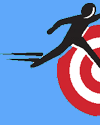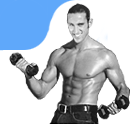




Water Tips: How Much Water Do I Need? Did you know that almost 75 percent of your body is made up of water? Every day you use up your body’s water supply when you sweat, go to the bathroom, run your everyday errands and, of course, exercise. You need to replace the water that you lose by drinking at least eight 8 oz. glasses a day. Proportionally, larger people need to drink larger quantities of water (approximately one additional glass for every 16 pounds of excess weight). Water is important to the body for many functions, ranging from assisting in basic muscle contraction, to maintaining clear and healthy skin. As toxins and impurities build up in the body, water is the most efficient way to flush out these unwanted elements. In fact, staying properly hydrated generally optimizes your metabolism, inherently burning off fat much more efficiently. In the body, the abundance of water is necessary to lubricate and maintain proper range of skeletal and muscular motion. Because the body fluctuates in regards to variables such as exercise or climate, a tough workout or a hot/dry day will require more water consumption for the body to function optimally. Additionally, you should increase the amount you drink if you are pregnant, breast-feeding, or consuming alcohol and/ or caffeine, or have diarrhea or fever. To calculate the minimum daily amount of water you should consume each day divide your body weight in pounds, by 16. This is the number of eight ounce glasses you should consume daily. Do You Drink Enough Water? Most people do
not consume an optimal amount of water, therefore, a significant
number of them experience symptoms such as muscle cramps, headaches,
and fatigue. Not drinking enough water may cause more than just
these symptoms. It contributes to constipation (When the body
receives too little water, it siphons what it needs from internal
sources and the result is constipation.) This increases the risk of
heat exhaustion or heat stroke. It also can cause and or contribute
to asthma, dental disease, kidney stones, and urinary-tract
infections and may even increase the risk of colds and cancer.
Insufficient water intake is a particular concern among older people
because aging, certain drugs, and certain diseases (such as diabetes
and stroke) may all weaken the sense of thirst. In fact, dehydration
is one of the top ten reasons why older people are hospitalized. On
a positive note, drinking the optimal amount of water daily relieves
constipation. The bowel will function normally and constipation
problems are minimized. There has been evidence suggesting that
drinking ample amount of water may provide more important health
benefits for example: reducing the risk of breast cancer, bladder
cancer and colon cancer, reducing chances of kidney stones and
asthma attacks. It can also contribute to better oral health,
significantly ease back and joint pain, reduce the risk of
developing, and increase weight lose. It is said that drinking the optimal amount of water daily can decreases the risk of colon cancer, breast cancer, significantly ease back and joint pain, and reduce the risk of developing bladder cancer. So, in closing, respect your body and drink plenty of water. "Sweat
plus sacrifice equals success."
|
Copyright © 2001. All
rights reserved. Republication or redistribution of Alessi Fitness content
is prohibited without the prior written consent of Alessi Fitness.
Alessi Fitness shall not be liable for any errors or delays
in the content, or for any actions taken in reliance thereon.
Questions or Comments ![]() Feedback
Feedback
